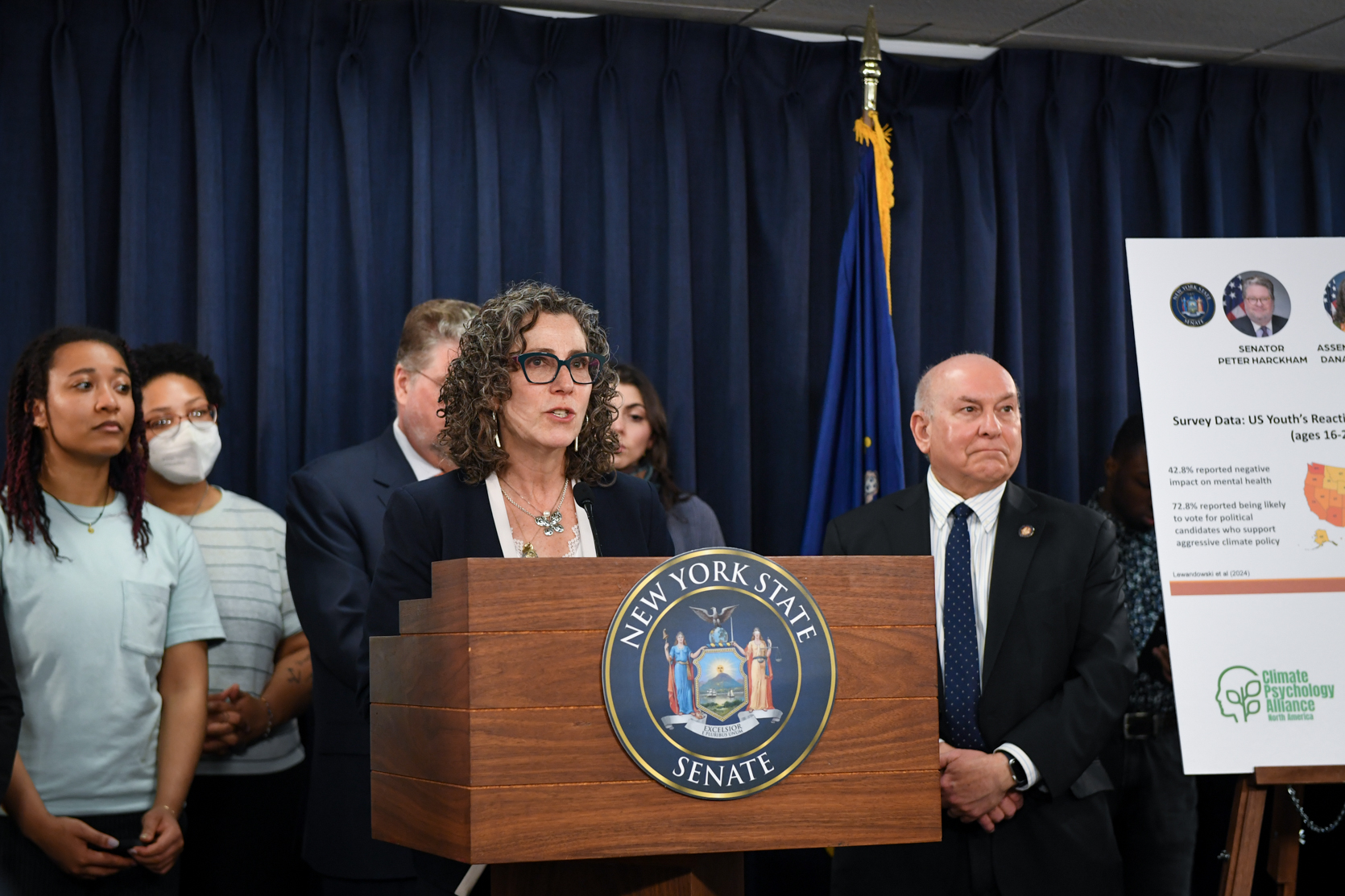Harckham, Levenberg Join Subject Matter Experts and Youth Advocates for “Youth Mental Health and the Climate Crisis: Science and Strategies”
Legislators encourage bold climate action to address a growing problem
Albany, NY – On Tuesday, State Senator Pete Harckham and Assemblywoman Dana Levenberg co-hosted a legislative briefing and press conference about the impacts of climate change on the mental health of young people and other vulnerable populations. Subject matter experts from the Climate Psychiatry Alliance and the Climate Psychology Alliance of North America discussed findings from recent research probing the negative mental health impacts of extreme weather and other aspects of the climate crisis.
The researchers have found that climate change impacts mental health through four main pathways. One is direct acute exposure, such as during an extreme weather event. Another is direct chronic exposure, such as continuous exposure to extreme heat. A third is indirect or vicarious exposure, such as witnessing the California wildfires through news reports and video. The fourth is anticipation of future events, based either on past direct experience or vicarious experience.
“Imagine being stuck in a flash flood like many New Yorkers were during a flood event in July 2023,” said Dr. Anthony Puliafico, an associate professor of medical psychology at Columbia University Irving Medical Center. “Imagine being stuck for hours, not being sure when and how you would be rescued. It makes sense that, afterward, you might feel an intense fear and anxiety the next time a storm is predicted or if it starts to rain while you are driving.” He went on to cite research indicating that flood victims are at high risk for developing PTSD, a serious mental illness with an estimated economic burden of approximately $232 billion annually in the United States. Costs such as these can be expected to rise as triggering events become more frequent.
The experts in attendance also shared new data drawn from a large-scale, rigorously-sampled survey of young people about their experiences of and thoughts about climate change. The overwhelming majority, 85%, reported being at least somewhat worried about climate change, with almost 58% identifying themselves as very or extremely worried. Nearly 43% of youth surveyed reported that climate change has had a negative impact on their mental health.
In their presentation, experts recommended integrating climate education into school curricula, as well as strengthening the physical, social and psychological resilience of communities through green infrastructure projects. They shared examples of projects incorporating sustainable materials that can create defenses against extreme weather while also providing space for daily recreation and socializing. They also suggested incorporating more mental health resources in disaster relief efforts. Advocates from Start:Empowerment, a youth-led climate and environmental justice education nonprofit, were also on hand to provide their perspective on climate change, mental health and the importance of climate education for the legislators in attendance.
"The climate crisis can feel overwhelming, but we still have the power to make a difference, and now is not the time to give up,” said Harckham. “Shifting the conversation away from hypothetical worst-case scenarios and instead celebrating our progress is crucial to inspire younger generations and remind them that hope is still within reach. The Climate Psychiatry Alliance and the Climate Psychology Alliance of North America play a vital role in supporting individuals, helping them stay engaged and focused on the path forward. I am proud to support them in their mission as we continue working to combat climate change."
"Something very important that I take away from my conversations with students is that lawmakers cannot just pass legislation. Once enacted, we must actually act on it,” said Levenberg. “We've passed the Climate Leadership and Community Protection Act, the Environmental Bond Act, Cap and Invest, and so much more, but we can't seem to actually move forward with transitioning away from fossil fuels and building up renewable energy. What we are hearing from young people is that we need to stop dilly-dallying. We can do this if we put our money where our mouths are. Seeing us work to create a sustainable future for our young people will help alleviate some of their anxiety about climate change." Levenberg identified budget items supporting climate resiliency and the passage of legislation like the New York HEAT Act as critical actions to take.
"I want to thank my colleagues, Senator Pete Harckham and Assemblywoman Dana Levenberg, for their leadership in recognizing this issue and sponsoring legislation to push us to do something about it,” said Assemblymember Chris Burdick. “I have heard from members of my own family that they are not planning to have children because they don't think we will have a habitable planet in 20 or 30 years' time. We need to follow parallel paths: one of dealing with the immediate issues posed by climate change, and one to address its underlying causes so that we can stop it from getting worse. We have the resources in this state; we need the political will to move forward on everything that should be done, like Cap and Invest. We can't keep pushing things into the future. This is a crisis and it needs to be handled now."
Senator Nathalia Fernandez said, "Climate change is not just an environmental or economic issue — it is a growing public health crisis impacting the mental well-being of our young people and the most vulnerable among us. The anxiety, trauma, and sense of uncertainty fueled by extreme weather and a changing climate are real and increasingly visible in our classrooms and communities. We have a responsibility to ensure our schools, healthcare systems, and policies are prepared to meet this challenge and provide the support young people need to thrive. Thank you, Senator Harckham and Assemblymember Levenberg, for insisting that this conversation belongs here – in the Legislature – where we have the power to act, not just observe."
Isabella Ramos, High School Junior and 3rd year member of Start:Empowerment’s Youth Program, said, "Living in the Bronx, we’ve seen firsthand how climate change affects us in so many negative ways. Working with groups like the Van Cortlandt Park Alliance has shown me how treating the environment helps us and others. It’s made me want to do more – not just for the planet, but because it makes me sad to know about all the issues and know about how climate change affects us."
Lougman Fanny, High School Sophomore and 1st year member of Start:Empowerment’s Youth Program, said, “There are certain things that schools should teach us that they don’t teach. We see these problems all around us and people need to be aware of what’s going on. It made me feel better to learn about things like air pollution and what we need to do to keep the environment clean, because it helps me better understand how to speak up for others who may have conditions like asthma which could be triggered by problems like air pollution. Learning about the climate crisis gives us knowledge and helps us understand the science, so we can know how to make things better in our communities.”
Photos available here. Video of the press conference available here.

